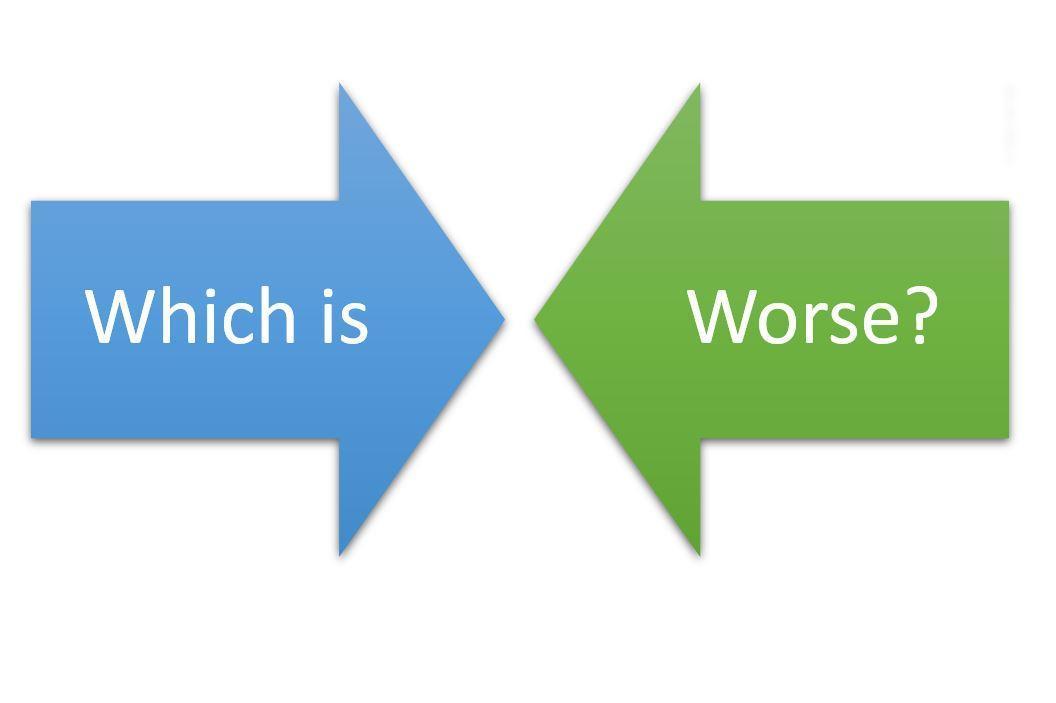Which of these fraud (embezzlement) scenarios is worse?
THIS BLOG IS OUT-OF-DATE!
This blog was moved in 2019 and renamed "Dental FraudBusters"
If you were forced to choose…
These are two of the various “financial misconduct” schemes that I encounter during my work.
Which of these scenarios is worse? If you had to, which one would you choose?
#1: A patient pays $100. Your employee steals the $100 and records a write-off of $100 on the patient’s ledger
#2: A patient was expected to pay $500, and pays $400. Your employee records a $400 payment and a $100 write-off on the patient’s ledger.
In both cases, the employee:
- acted intentionally
- acted without authorization
- did not inform the practice owner
- caused a $100 loss
So, how are they different?
In Case #1, the employee stole $100, and was unjustly enriched.
Let’s call this scheme “Ma Barker”
In Case #2, the employee directed a benefit of $100 to the patient.
Let’s call this scheme “Robin Hood”
It’s important to keep in mind that Ma Barker and Robin Hood schemes never involve a single event as described above. These schemes are repeated and over time can result in staggering losses.
To illustrate a point, and keep things simple, let’s imagine that:
- Ma Barker and Robin Hood repeated their schemes for two years and caused a loss of $80,000 to the practice owner.
- Each practice owner has $80,000 in employee dishonesty insurance coverage
The implications in the Ma Barker case are somewhat straightforward.
The employee was motivated by greed or “need” to steal your money. When the employee is caught, you can fire the employee for stealing and seek criminal prosecution. You will not have to pay severance to the employee and your unemployment tax will not increase. You can make a claim of $80,000 against your employment dishonesty insurance and you will get your money back. (in reality, most practice owners have $25,000 or less in dishonesty coverage)
The implications of the Robin Hood case are not straightforward.
The employee’s motivation to reduce the amount owing from the patient is idiosyncratic. All employees who perpetrate Robin Hood schemes gain some benefit for themselves. They may “hate collecting co-payments” or “calling patients for money”. Others do it to reduce accounts receivable balances, which makes the employee appear very efficient. Every employee that becomes a Robin Hood will also enjoy favor from your patients.
Patients in a Robin Hood practice are usually unaware they your employee is stealing from you. What they do know is that your practice “gives them a break”. Robin Hood employees often tell patients things like: “don’t worry if your insurance does not cover the full amount, I’ll take care of it” or “I’ll reduce your payment by $100 today, so you will not be billed”
These words are “music to your patients’ ears” and support a “culture of financial entitlement” among your patient base. The implications of this can be devastating.
Removing a Robin Hood from your practice requires special handling. These employees will vigorously defend their actions, often claiming that you knew about, or authorized the reductions.
You can terminate the employee for misconduct but only if you carefully plan and execute it. (using what I call a “reverse onus- suspension-termination”) If you fire your employee without this planning, you may be sued for severance or wrongful dismissal. (yes, this has happened)
You can file a claim for $80,000 against your employee dishonesty insurance. Some policies will not cover Robin Hood schemes while others do. If you prepare the dishonesty claim yourself, your insurance payout will be low to none. If you have an expert prepare your claim, your chances of getting a higher settlement increase dramatically. (there are many factors to consider and outside the scope of this post)
Because Robin Hood schemes create benefits for patients that you did not intend to give, and over time a culture of financial entitlement builds among your patients.
After you remove the Robin Hood employee, your office will start to “properly bill” for your services. This will cause your financially entitled patients to complain about having to pay more for services and some will leave the practice. i.e.: “Why do I have to pay now? I did not have to pay before!” “Where is Robin Hood? I only want to deal with her.” (in one case, over 25% of the patients left the practice)
Also, criminal prosecution is more difficult in Robin Hood cases.
so, if I had to choose, I would rather have Ma Barker in my practice than Robin Hood.
The problem for dentists is that there are many more Robin Hoods working in dental offices than Ma Barkers.



